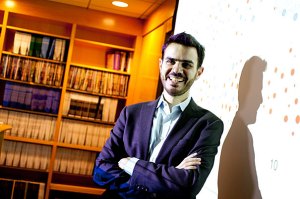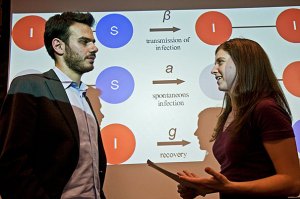Tag: Department of Psychology
-
Science & Tech
Giving ‘good’ a rigorous inspection
Harvard scholars Joshua Greene and Steven Pinker were joined by Princeton philosopher Peter Singer in a conversation examining how to be moral — and happy.
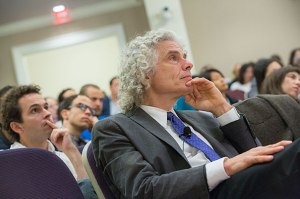
-
Campus & Community
Ellen Langer joins group of geniuses
Ellen Langer, professor of psychology, is among the 2016 recipients of the Liberty Science Center Genius Awards.
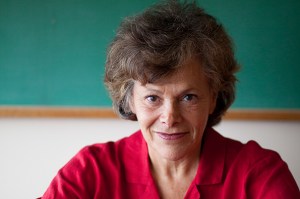
-
Campus & Community
Seeing again, for the first time
Mahzarin Banaji delivered the final Diversity Dialogue of the year titled “Blindspot: The Hidden Biases of Good People.”
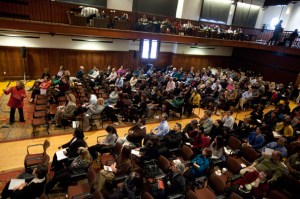
-
Science & Tech
Oh, the humanity
Using digitized books as a “cultural genome,” a team of researchers from Harvard, Google, Encyclopaedia Britannica, and the American Heritage Dictionary, unveil a quantitative approach to centuries of trends.
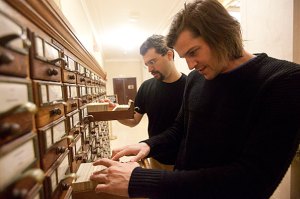
-
Campus & Community
Brendan Arnold Maher
At a Meeting of the Faculty of Arts and Sciences on April 6, 2010, the Minute honoring the life and service of the late Brendan Arnold Maher, Edward C. Henderson Professor of the Psychology of Personality, Emeritus, was placed upon the records. Maher’s scholarship centered on the complex theoretical and empirical problems surrounding human psychopathology.
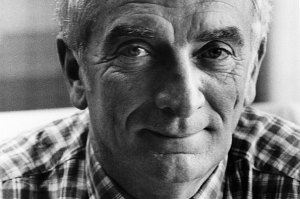
-
Science & Tech
Major moral decisions use general-purpose brain circuits to manage uncertainty
Harvard researchers have found that humans can make difficult moral decisions using the same brain circuits as those used in more mundane choices related to money and food. These circuits,…
-
Health
What’s right for me?
In a new study, Harvard scientists find that humans can make difficult moral decisions using the same brain circuits as those used on more mundane choices such as money or food.

-
Health
Warnings of suicidal intent
Two powerful new tests developed by Harvard psychologists show great promise in predicting patients’ risk of attempting suicide, researchers say. These tests may help clinicians to overcome their reliance on…
-
Science & Tech
Posing the Big Questions
In 1900, renowned mathematician David Hilbert laid down a challenge to future generations: 23 handpicked mathematical problems, all difficult, all important, and all unsolved. Since then, countless mathematicians around the world have struggled…
-
Health
A ‘mind-blowing’ day
Vermont high school students explore the human brain, with help from Harvard scholars.
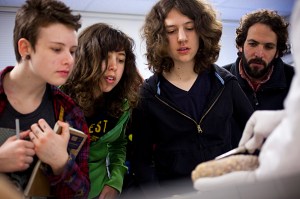
-
Science & Tech
Facing your preferences
Researchers discover that similar qualities of observation drive gay and straight men in their judgments on attractiveness.
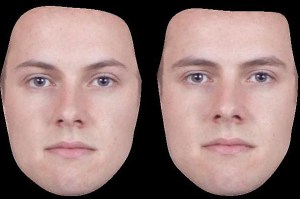
-
Health
Finding the seat of language?
A team of Harvard and University of California, San Diego (UCSD), researchers report having pinpointed an area of the brain where three essential components of language — word identification, grammar,…
-
Science & Tech
What really matters
Outcomes matter more than intention when choosing to punish or reward individuals who’ve caused accidents, according to new research from Harvard University.
-
Health
‘Super-recognizers’ never forget a face
Some people say they never forget a face, a claim now bolstered by psychologists at Harvard University who’ve discovered a group they call “super-recognizers”: those who can easily recognize someone…
-
Health
Some vocal-mimicking animals, particularly parrots, can move to a musical beat
Researchers at Harvard University have found that humans aren’t the only ones who can groove to a beat — some other species can dance, too. The capability was previously believed…
-
Science & Tech
Susan Carey receives David E. Rumelhart Prize
Susan Carey, a Harvard psychologist whose work has explored fundamental issues surrounding the nature of the human mind, has been awarded the 2009 David E. Rumelhart Prize, given annually since…
-
Science & Tech
Roads not taken disappear more quickly than we realize
Researchers have identified a key reason why people make mistakes when they try to predict what they will like. According to the findings presented Sunday at the annual meeting of…
-
Science & Tech
Hauser presents theory of “humaniqueness”
Shedding new light on the great cognitive rift between humans and animals, a Harvard University scientist has synthesized four key differences in human and animal cognition into a hypothesis on…
-
Science & Tech
Neuroimaging fails to demonstrate ESP is real
Psychologists at Harvard University have developed a new method to study extrasensory perception that, they argue, can resolve the century-old debate over its existence. According to the authors, their study…
-
Health
Even in healthy elderly, brain systems become less coordinated
Some brain systems become less coordinated with age even in the absence of Alzheimer’s disease, according to a new study from Harvard University. The results help to explain why advanced…
-
Science & Tech
Tracking down the seat of moral reasoning
Moral philosophers have long grappled with ethical questions, creating hypotheticals that test basic beliefs about right and wrong. For example: A trolley is running down a track out of control.…
-
Health
Ursano: Stopping post-traumatic stress disorder before it happens
Mental health professionals are aware of the importance of understanding the kinds of illnesses — such as depression and post-traumatic stress disorder (PTSD) — that can result from disasters both natural and human-made. But perhaps even more crucial, according to Robert J. Ursano, is that they understand the behaviors associated with such events.



